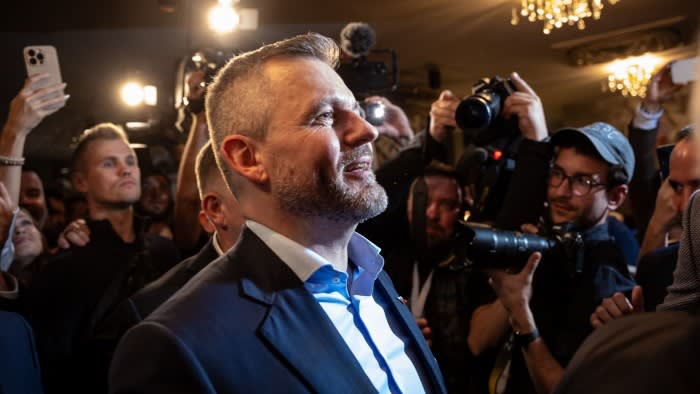Unlock the Editor’s Digest for free
Roula Khalaf, Editor of the FT, selects her favourite stories in this weekly newsletter.
Peter Pellegrini has been elected president of Slovakia, consolidating the grip of the ruling coalition led by Robert Fico and tilting the country further towards Russia.
Pellegrini defeated former foreign minister Ivan Korčok by winning 53 per cent of the votes in Saturday’s run-off election, according to official results published on Sunday.
His narrow win followed a vitriolic campaign during which Pellegrini accused the pro-EU and pro-Nato Korčok of wanting to drag Slovakia into the Russia-Ukraine war.
Fico’s coalition has claimed it was defending Slovakian sovereignty against western efforts to ramp up military aid to Kyiv. The Eurosceptic Fico has also opposed placing further sanctions on Moscow and his foreign minister met last month his Russian counterpart in Turkey.
Milan Nič, an analyst at the German Council on Foreign Relations, said Pellegrini won by “recasting the run-off on fear from the war in Ukraine and resentment to pro-Western elites”. He also said Pellegrini ran “an extraordinary smear campaign” by presenting his rival as a warmongering candidate who wanted Slovakia to intervene in Ukraine’s conflict.
Korčok told supporters as he conceded defeat: “It turns out you can become president by not only spreading hatred and whipping up passions, but you can also win by making the other party a candidate for war.”
Pellegrini responded by pledging that “I will do everything to ensure Slovakia remains on the side of peace and not war, and let anyone criticise me for it if they want”.
The presidential election gained significance after Fico’s three-party coalition took office last October pledging to stop migration and discontinue help to Ukraine. Fico started his fourth mandate as prime minister, while Pellegrini became parliamentary speaker.
Korčok, 60, had instead called on voters to elect him as a counterweight to stop Fico’s coalition from having full control over the executive.
Korčok ran as an independent candidate but with the backing of the main liberal opposition parties as well as outgoing president Zuzana Čaputová, who recently warned that Fico’s government was “testing the limits” of democracy by overhauling the judiciary and clamping down on independent media and civil society organisations.
Pellegrini, 48, started in politics within Fico’s Smer party, but broke ranks with his mentor to form his own party, Hlas, which came third in last year’s parliamentary election. As part of part of his coalition deal, Fico then agreed to back Pellegrini’s bid for the presidency.
Slovakia’s president has a largely ceremonial role but can delay legislation by triggering constitutional reviews and also has the right to appoint and dismiss judges on the top court.
Čaputová recently used her powers to refer to the constitutional court parts of a criminal law reform that Fico’s government pushed through parliament in February. Still, she could not stop Fico from closing the country’s anti-corruption office, despite street protests and warnings from Brussels about safeguarding the rule of law.
In the first round of the presidential election two weeks ago, Korčok defeated Pellegrini by winning 42.5 per cent of the votes against 37 per cent, but this outcome fell short of the absolute majority required to avoid a run-off.
